She Forgot, She Remembered
By Sabina Rosa Guardado
December 8, 2024
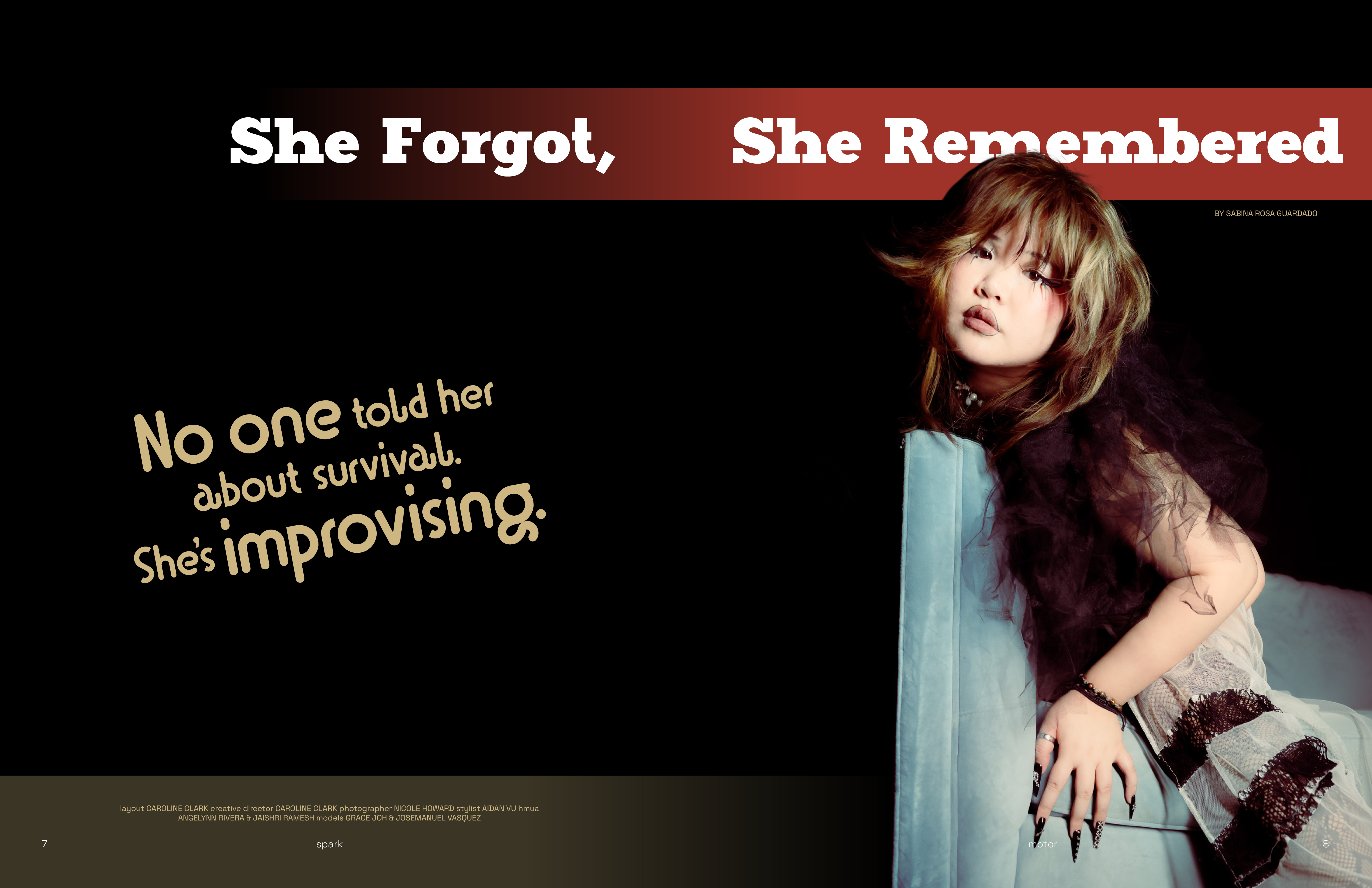
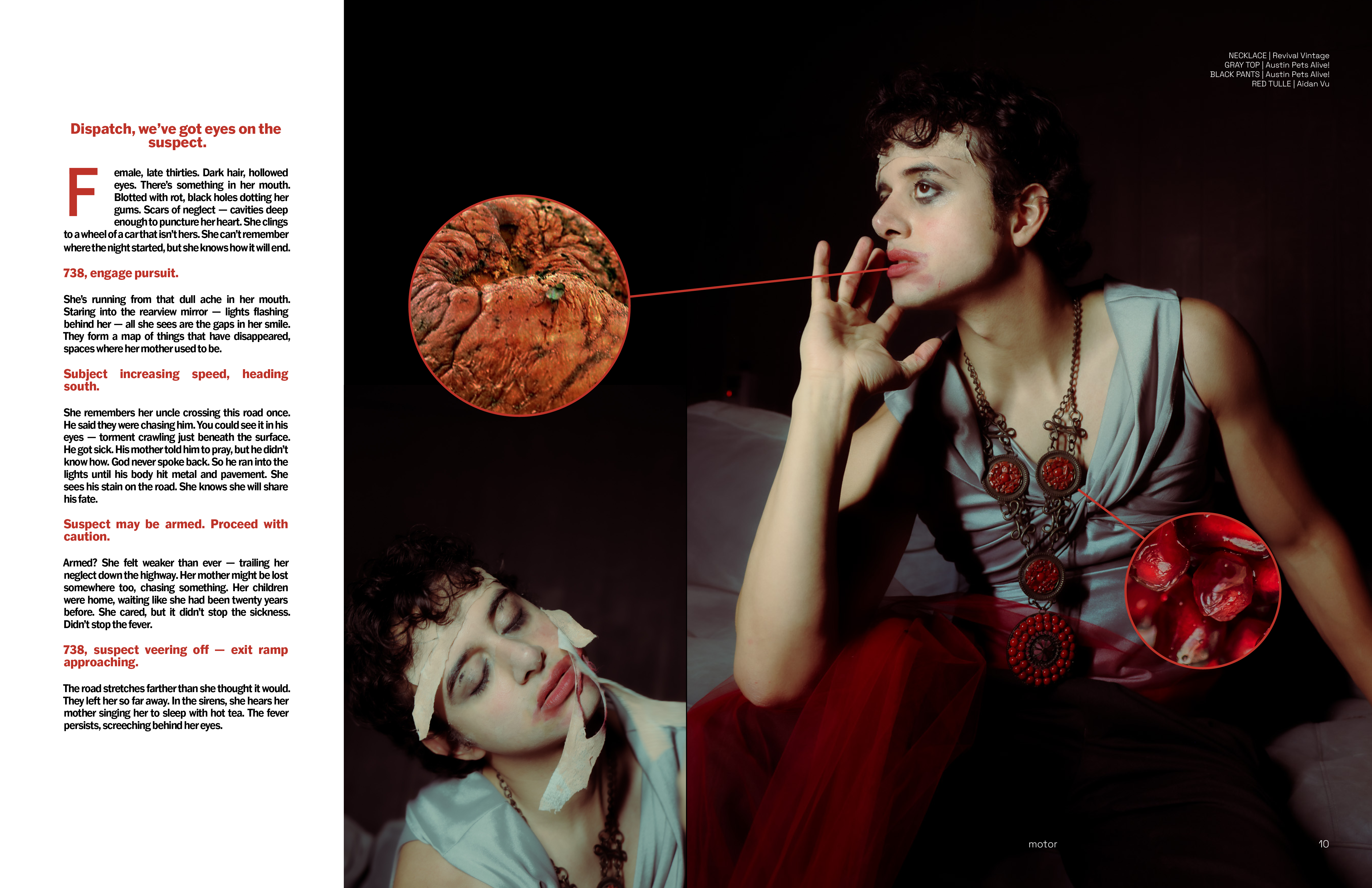
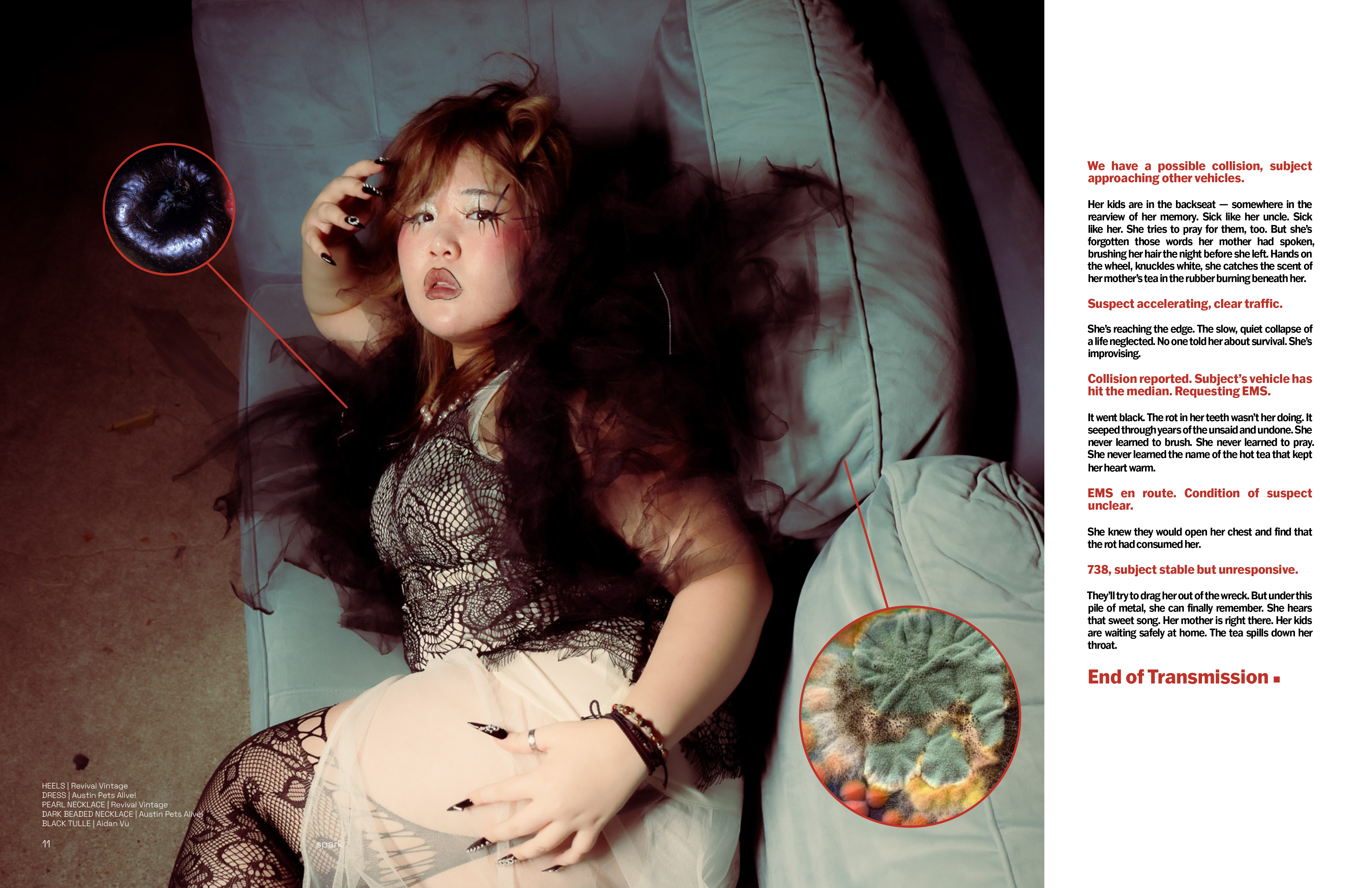
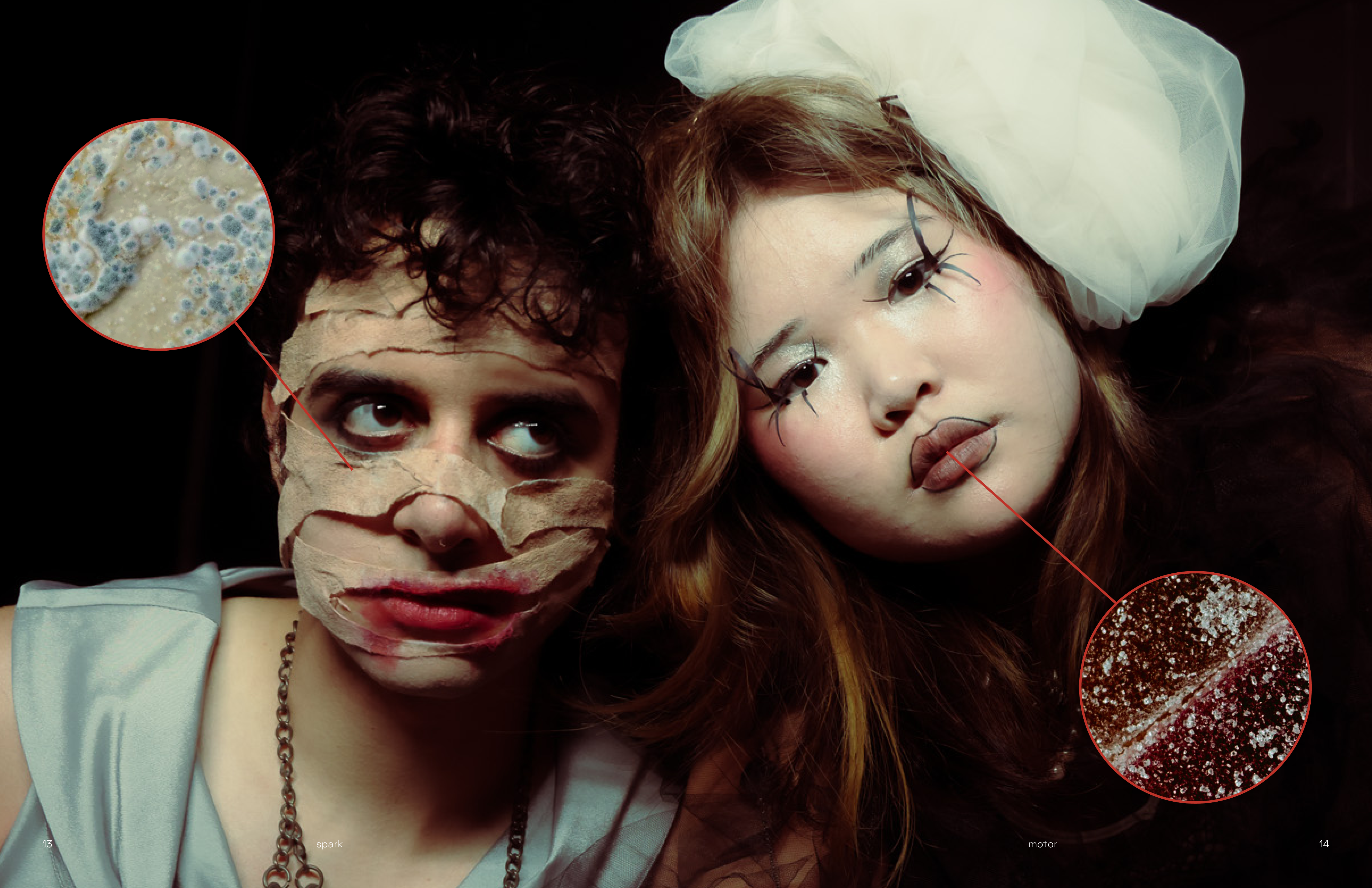
No one told her about survival. She’s improvising.
Dispatch, we’ve got eyes on the suspect.
Female, late thirties. Dark hair, hollowed eyes. There’s something in her mouth. Blotted with rot, black holes dotting her gums. Scars of neglect — cavities deep enough to puncture her heart. She clings to a wheel of a car that isn’t hers. She can’t remember where the night started, but she knows how it will end.
738, engage pursuit.
She’s running from that dull ache in her mouth. Staring into the rearview mirror — lights flashing behind her — all she sees are the gaps in her smile. They form a map of things that have disappeared, spaces where her mother used to be.
Subject increasing speed, heading south.
She remembers her uncle once crossing this road. He said they were chasing him. You could see it in his eyes — torment crawling just beneath the surface. He went sick.
His mother told him to pray, but he didn’t know how. God never spoke back. So he ran into the lights until his body hit metal and pavement. She sees his stain on the road. She knows she will share his fate.
Suspect may be armed. Proceed with caution.
Armed? She felt weaker than ever — trailing her neglect down the highway. Her mother might be lost somewhere too, chasing something. Her children were home, waiting like she had been twenty years before. She cared, but it didn’t stop the sickness. Didn’t stop the fever.
738, suspect veering off — exit ramp approaching.
The road stretches further than she thought it would. They left her so far away. In the sirens she hears her mother singing her to sleep with hot tea. The fever persists, screeching behind her eyes.
We have a possible collision, subject approaching other vehicles.
Her kids are in the backseat — somewhere in the rearview of her memory. Sick like her uncle. Sick like her. She tries to pray for them, too. But she’s forgotten those words her mother had spoken, brushing her hair the night before she left. Hands on the wheel, knuckles white, she catches the scent of her mother’s tea in the burning rubber beneath her.
Suspect accelerating, clear traffic.
She’s reaching the edge. The slow, quiet collapse of a life neglected. No one told her about survival. She’s improvising.
Collision reported. Subject’s vehicle has hit the median. Requesting EMS.
It went black. The rot in her teeth wasn’t her doing. It seeped through years of the unsaid and undone. She never learned to brush. She never learned to pray. She never learned the name of the hot tea that kept her heart warm.
EMS en route. Condition of suspect unclear.
She knew they would open her chest and find that the rot had consumed her.
738, subject stable but unresponsive.
They’ll try to drag her out of the wreck. But under this pile of metal she can finally remember. She hears that sweet song. Her mother is right there. Her kids are waiting safely at home. The tea spills down her throat.
End of Transmission ■
Layout & Creative Director: Caroline Clark
Photographer: Nicole Howard
Stylists: Aidan Vu
HMUA: Angelynn Rivera & Jaishri Ramesh
Models: Grace Joh & Josemanuel Vasquez
Other Stories in Motor
Goodnight Cowboy
By Caleb Morrow
December 8, 2024
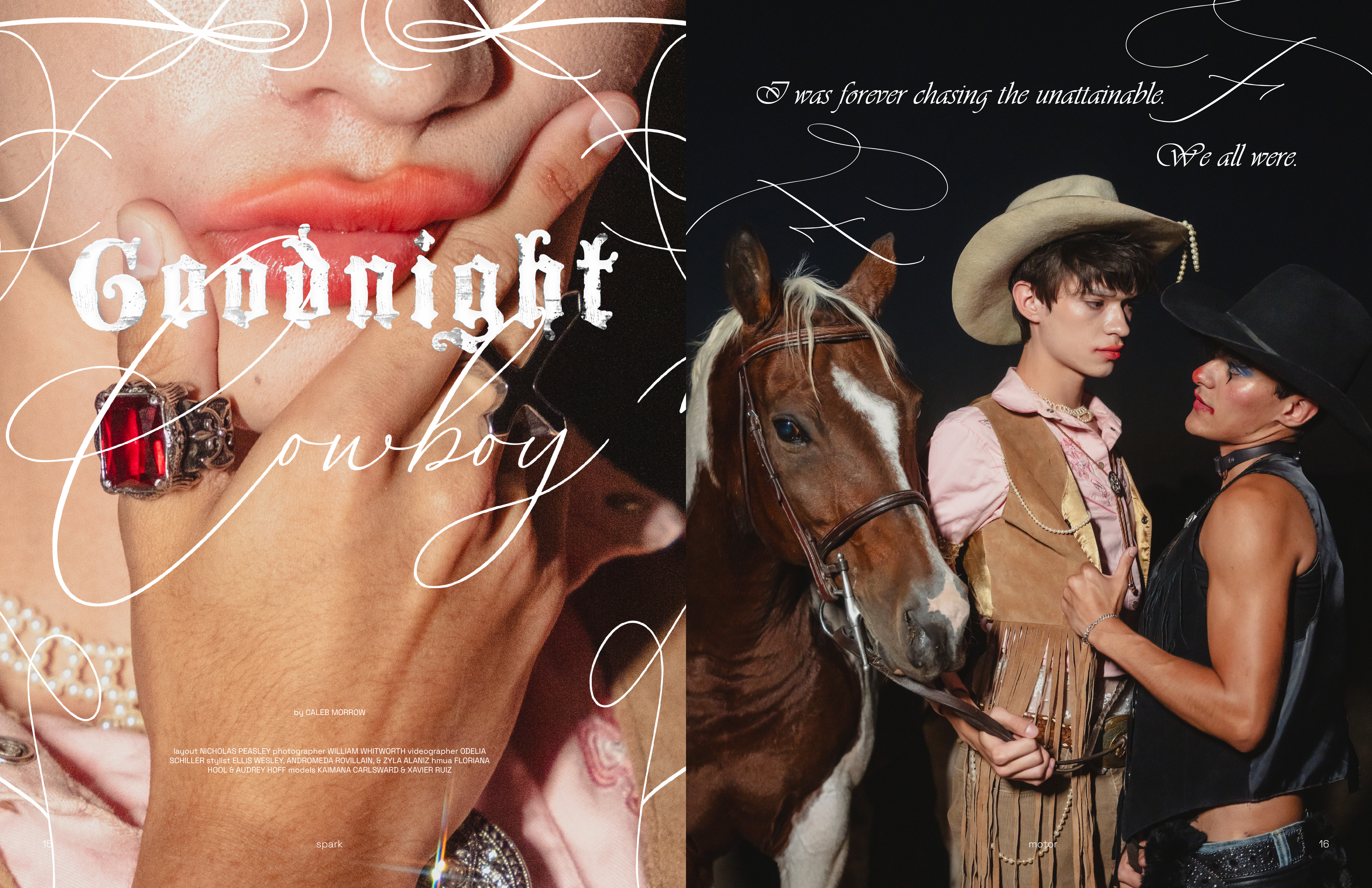
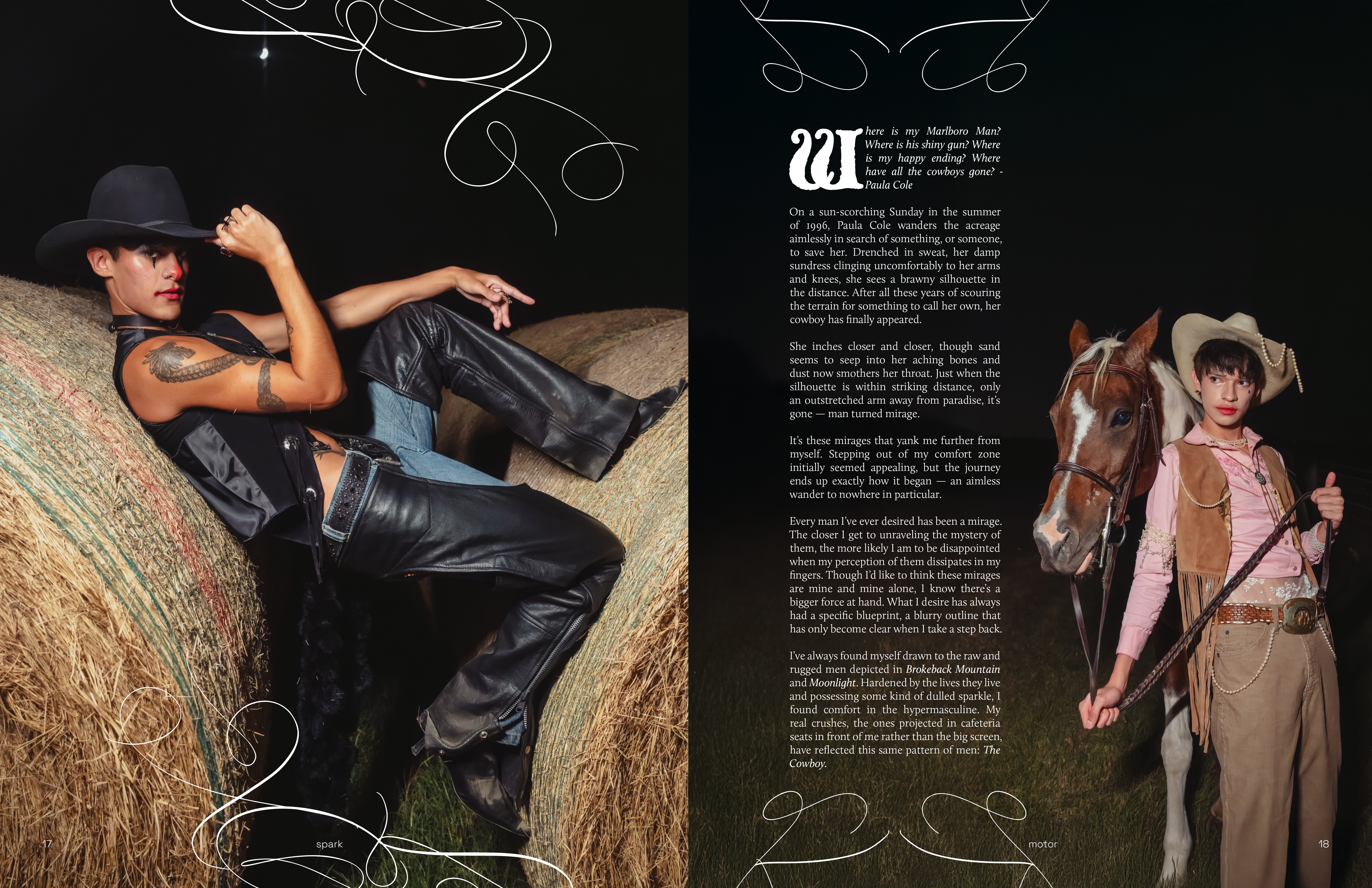

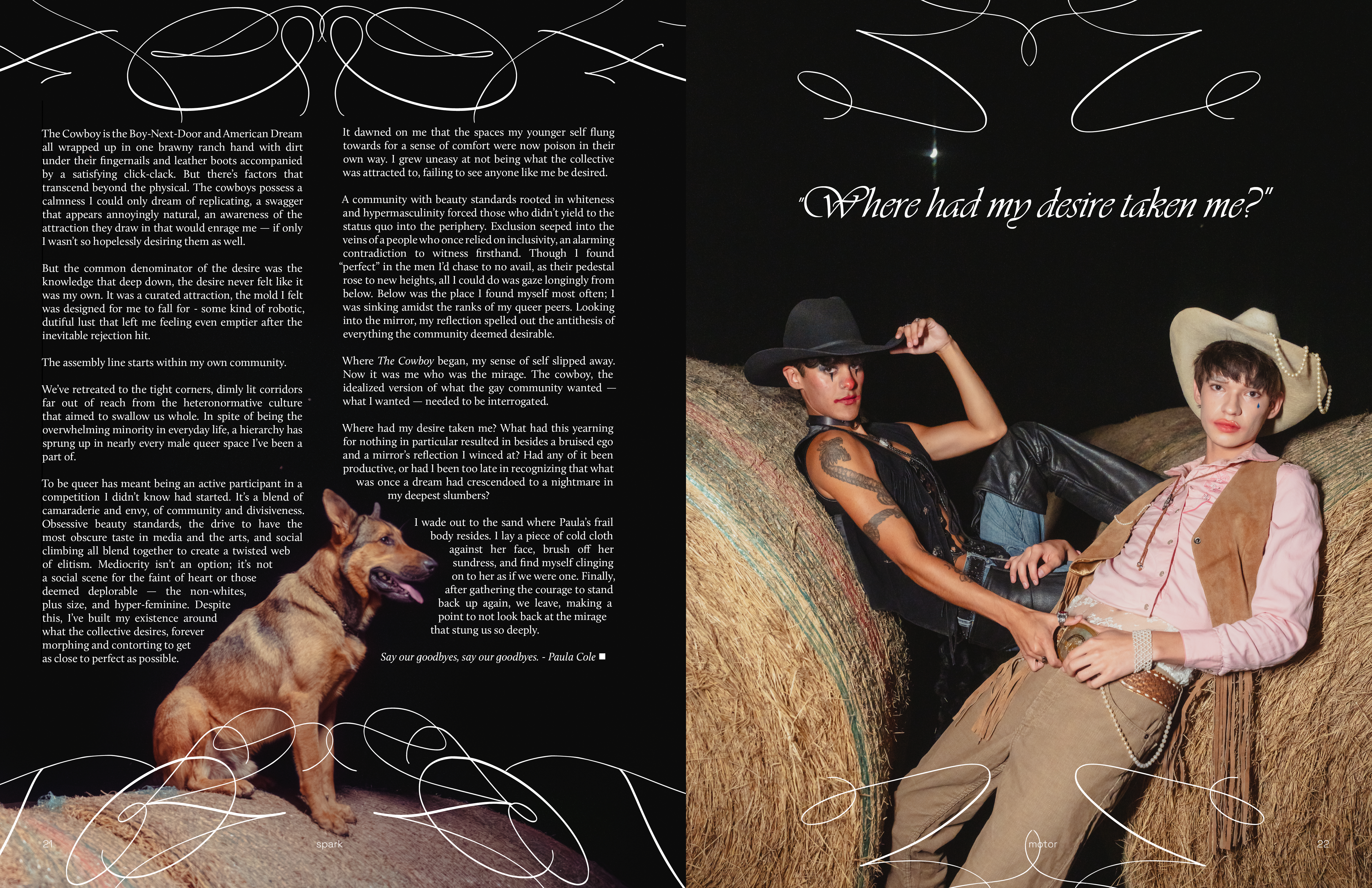
| I was forever chasing the unattainable. We all were. |
“Where is my Marlboro Man? Where is his shiny gun? Where is my happy ending? Where have all the cowboys gone? - Paula Cole
On a sun-scorching Sunday in the summer of 1996, Paula Cole wanders the acreage aimlessly in search of something, or someone, to save her. Drenched in sweat, her damp sundress clinging uncomfortably to her arms and knees, she sees a brawny silhouette in the distance. After all these years of scouring the terrain for something to call her own, her cowboy has finally appeared.
She inches closer and closer, though sand seems to seep into her aching bones and dust now smothers her throat. Just when the silhouette is within striking distance, only an outstretched arm away from paradise, it’s gone — man turned mirage.
It’s these mirages that yank me further from myself. Stepping out of my comfort zone initially seemed appealing, but the journey ends up exactly how it began – an aimless wander to nowhere in particular.
Every man I’ve ever desired has been a mirage. The closer I get to unraveling the mystery of them, the more likely I am to be disappointed when my perception of them dissipates in my fingers. Though I’d like to think these mirages are mine and mine alone, I know there’s a bigger force at hand. What I desire has always had a specific blueprint, a blurry outline that has only become clear when I take a step back.
I’ve always found myself drawn to the raw and rugged men depicted in Brokeback Mountain and Moonlight. Hardened by the lives they live and possessing some kind of dulled sparkle, I found comfort in the hypermasculine. My real crushes, the ones projected in cafeteria seats in front of me rather than the big screen, have reflected this same pattern of men: the Cowboy.
The Cowboy is the Boy-Next-Door and American Dream all wrapped up in one brawny ranch hand with dirt under their fingernails and leather boots accompanied by a satisfying click-clack. But there’s factors that transcend beyond the physical. The cowboys possess a calmness I could only dream of replicating, a swagger that appears annoyingly natural, an awareness of the attraction they draw in that would enrage me – if only I wasn’t so hopelessly desiring them as well.
But the common denominator of the desire was the knowledge that deep down, the desire never felt like it was my own. It was a curated attraction, the mold I felt was designed for me to fall for - some kind of robotic, dutiful lust that left me feeling even emptier after the inevitable rejection hit.
The assembly line starts within my own community.
We’ve retreated to the tight corners, dimly lit corridors far out of reach from the heteronormative culture that aimed to swallow us whole. In spite of being the overwhelming minority in everyday life, a hierarchy has sprung up in nearly every male queer space I’ve been a part of.
To be queer has meant being an active participant in a competition I didn’t know had started. It’s a blend of camaraderie and envy, of community and divisiveness. Obsessive beauty standards, the drive to have the most obscure taste in media and the arts, and social climbing all blend together to create a twisted web of elitism. Mediocrity isn’t an option; it’s not a social scene for the faint of heart or those deemed deplorable - the non-whites, plus size, and hyper- feminine. Despite this, I’ve built my existence around what the collective desires, forever morphing and contorting to get as close to perfect as possible.
It dawned on me that the spaces my younger self flung towards for a sense of comfort were now poison in their own way. I grew uneasy at not being what the collective was attracted to, failing to see anyone like me be desired.
A community with beauty standards rooted in whiteness and hypermasculinity forced those who didn’t yield to the status quo into the periphery. Exclusion seeped into the veins of a people who once relied on inclusivity, an alarming contradiction to witness firsthand. Though I found “perfect” in the men I’d chase to no avail, as their pedestal rose to new heights, all I could do was gaze longingly from below. Below was the place I found myself most often; I was sinking amidst the ranks of my queer peers. Looking into the mirror, my reflection spelled out the antithesis of everything the community deemed desirable.
Where The Cowboy began, my sense of self slipped away. Now it was me who was the mirage.
The cowboy, the idealized version of what the gay community wanted - what I wanted - needed to be interrogated.
Where had my desire taken me? What had this yearning for nothing in particular resulted in besides a bruised ego and a mirror’s reflection I winced at? Had any of it been productive, or had I been too late in recognizing that what was once a dream had crescendoed to a nightmare in my deepest slumbers?
I wade out to the sand where Paula’s frail body resides. I lay a piece of cold cloth against her face, brush off her sundress, and find myself clinging on to her as if we were one. Finally, after gathering the courage to stand back up again, we leave, making a point to not look back at the mirage that stung us so deeply.
Say our goodbyes, say our goodbyes. - Paula Cole ■
Layout: Nicholas Peasley
Photographer: William Whitworth
Videographer: Odelia Schiller
Stylists: Ellis Wesley, Andromeda Rovillain, Zyla Alaniz
HMUA: Floriana Hool & Audrey Hoff
Models: Kaimana Carlsward & Xavier Ruiz
Other Stories in Motor
Asphalt
By Danielle Yampuler
December 8, 2024
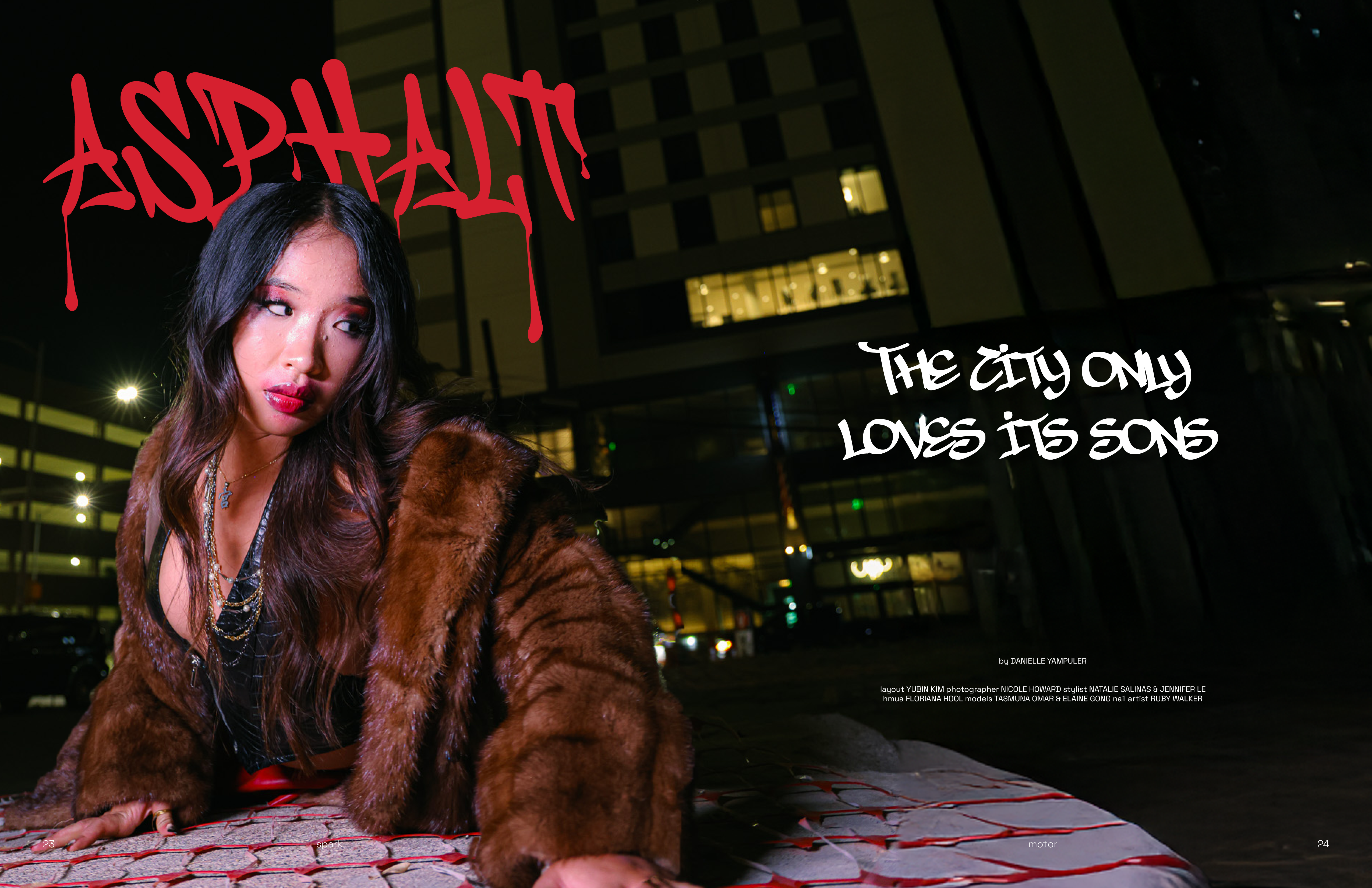
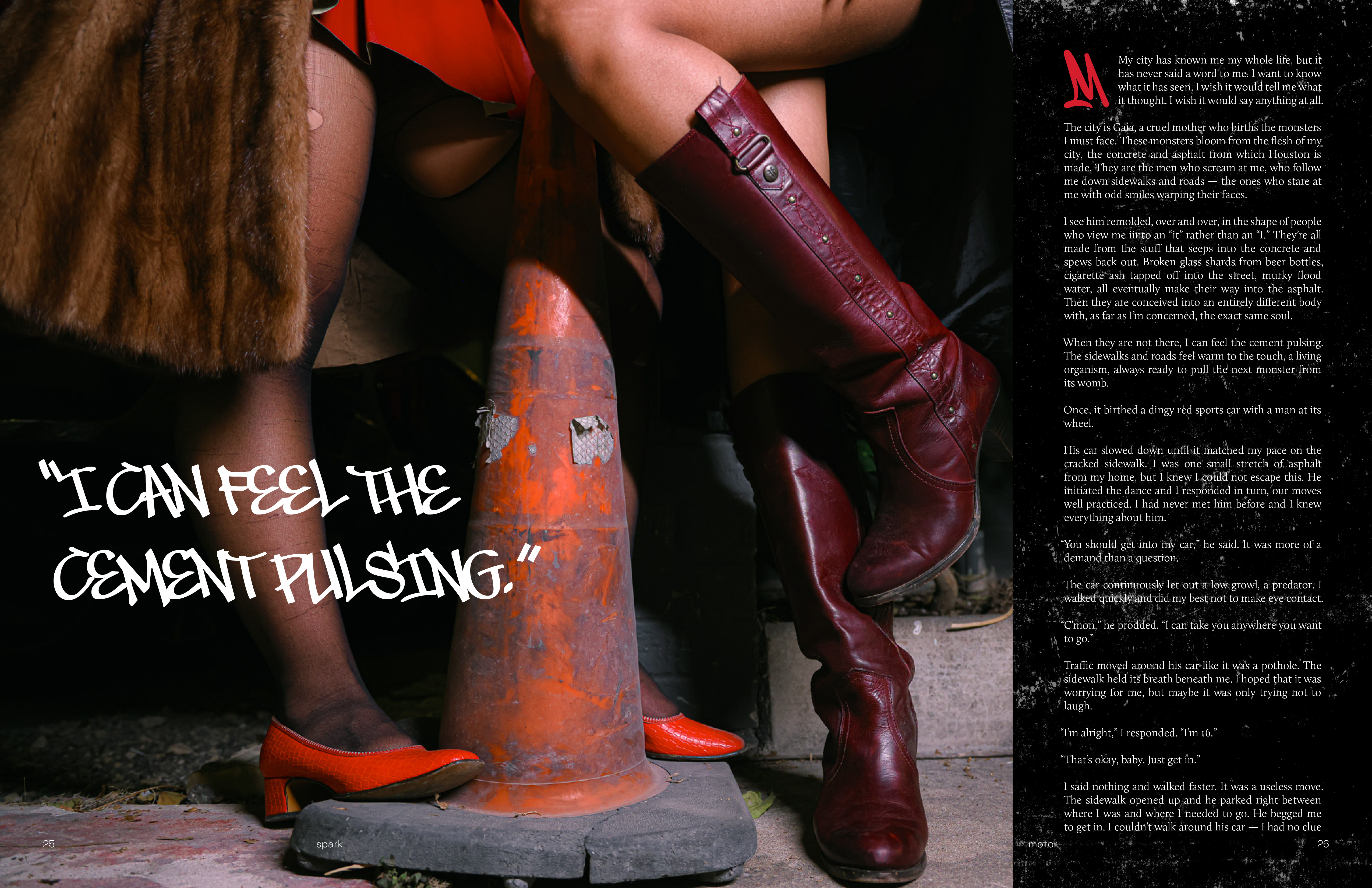
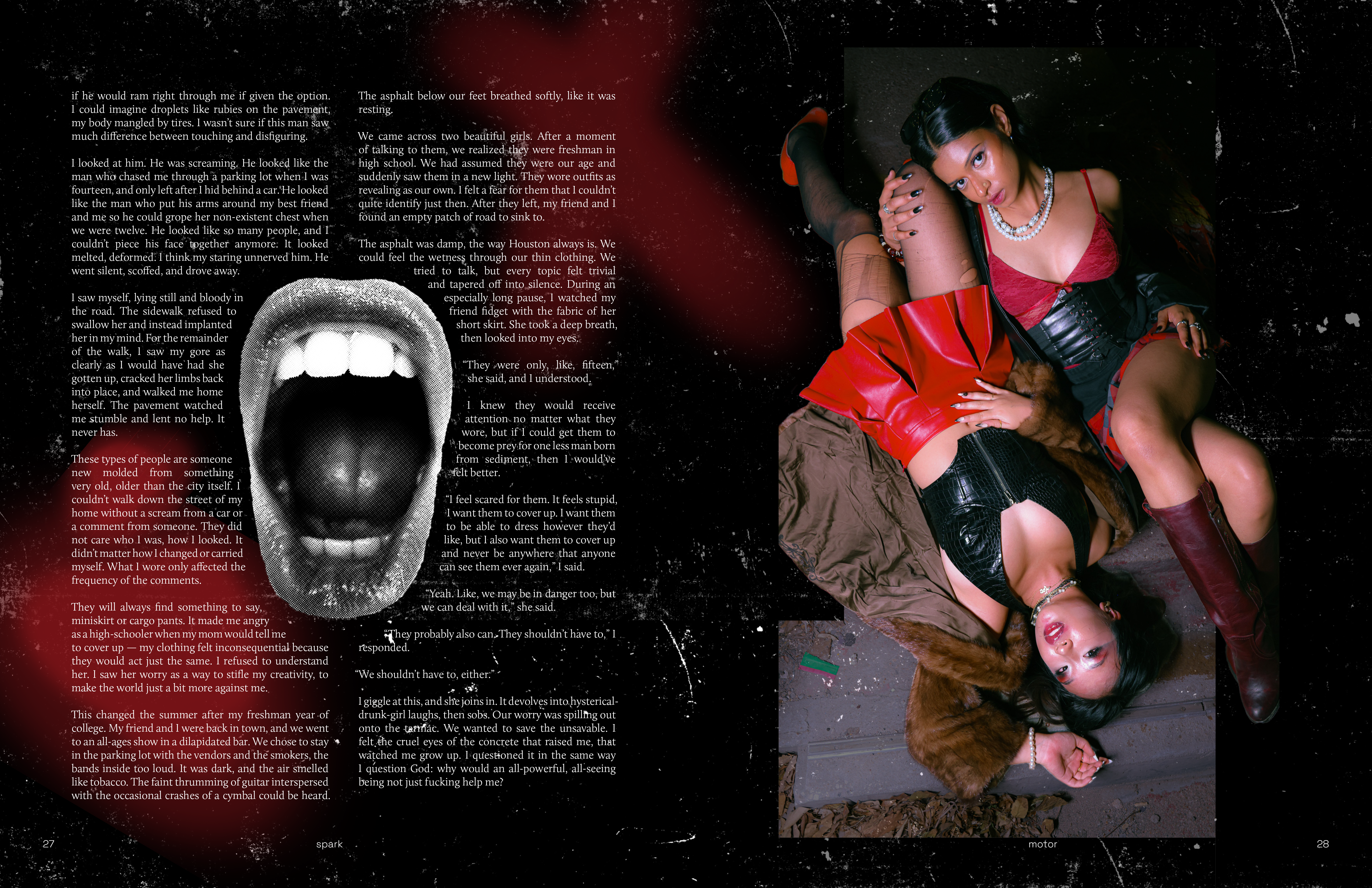
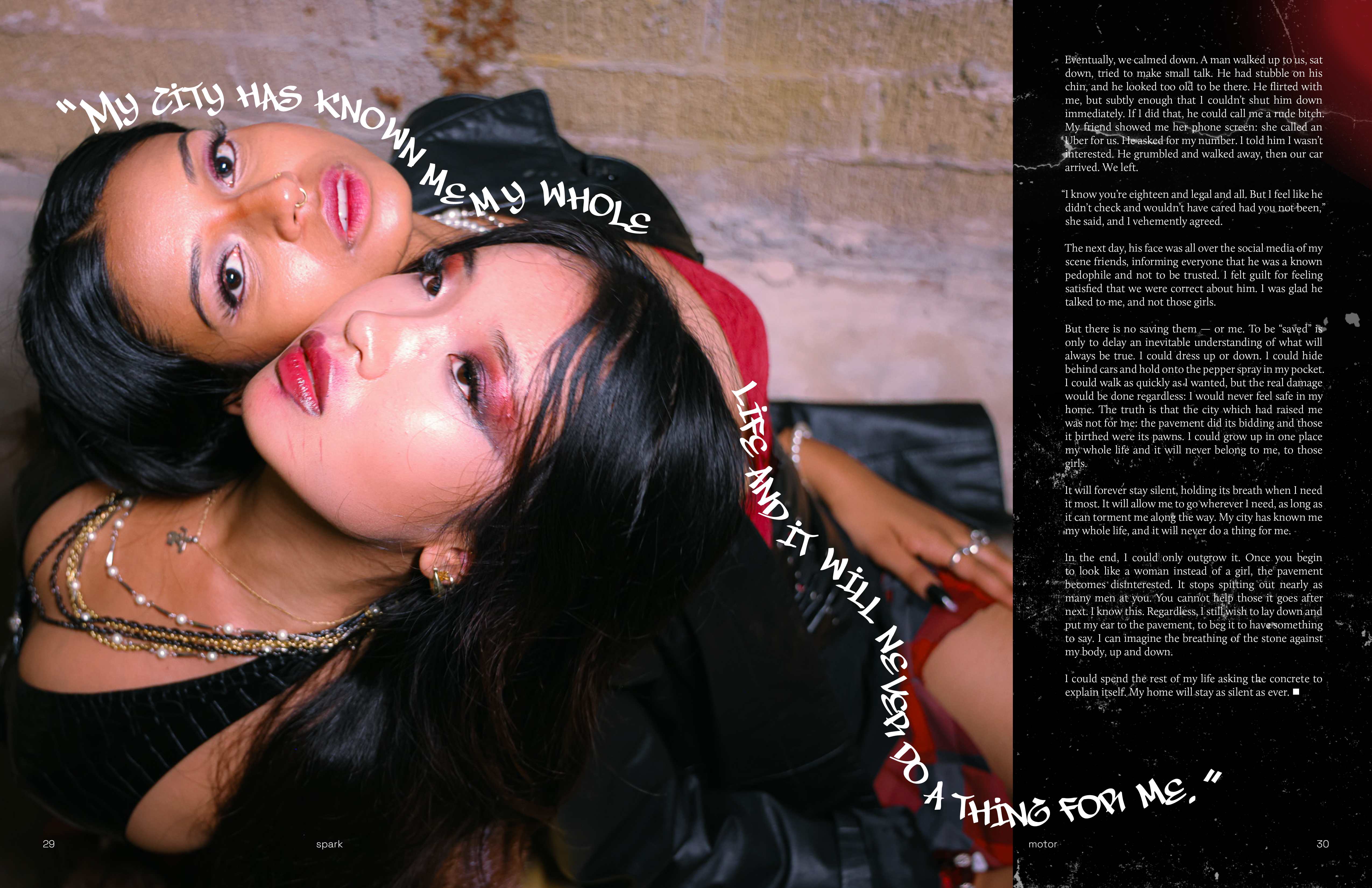
| The city only loves its sons. |
My city has known me my whole life but it has never said a word to me. I want to know what it has seen. I wish it’d tell me what it thought. I wish it’d say anything at all.
The city is Gaia, a cruel mother who births the monsters I must face. These monsters bloom from the flesh of my city, the concrete and asphalt from which Houston is made. They are the men who scream at me, who follow me down sidewalks and roads — the ones who stare at me with odd smiles that warp their faces.
I see him remolded, over and over, in the shape of people who view me as an “it” rather than an “I.” They’re all made from the stuff that seeps into the concrete and gets spewed back out. Broken glass shards from beer bottles, cigarette ash tapped off into the street, murky flood water, they all eventually make their way into the asphalt. Then they are conceived into an entirely different body with, as far as I’m concerned, the exact same soul.
When they are not there, I can feel the cement pulsing. The sidewalks and roads feel warm to the touch, a living organism, always ready to pull the next monster from its womb.
Once, it birthed a dingy red sports car with a man at its wheel.
His car slowed down until it matched my pace on the cracked sidewalk. I was one small stretch of asphalt from my home, but I knew I could not escape this. He initiated the dance and I responded in turn, our moves well practiced. I had never met him before and I knew everything about him.
“You should get into my car,” he stated. It was more of a demand than a question.
The car continuously let out a low growl, a predator. I walked quickly and did my best not to make eye contact.
“C’mon. I can take you anywhere you want to go,” he prodded.
Traffic moved around his car like it was a pothole. The sidewalk held its breath beneath me. I hoped that it was worrying for me, but maybe it was only trying not to laugh.
I responded, “I’m alright. I’m sixteen.”
“That’s okay, baby. Just get in.”
I said nothing and walked faster. It was a useless move. The sidewalk opened up and he parked right between where I was and where I needed to go. He begged me to get in. I couldn’t walk around his car — I had no clue if he would ram right through me if given the option. I could imagine droplets like rubies on the pavement, my body mangled by tires. I wasn’t sure if this man saw much difference between touching and disfiguring.
I looked at him. He was screaming. He looked like the man who chased me through a parking lot when I was fourteen, and only left after I hid behind a car. He looked like the man who put his arms around my best friend and me so he could grope her non-existent chest when we were twelve. He looked like so many people, and I couldn’t piece his face together anymore. It looked melted, deformed. I think my staring unnerved him. He went silent, scoffed, and drove away.
I saw myself, lying still and bloody in the road. The sidewalk refused to swallow her and instead implanted her in my mind. For the remainder of the walk, I saw my gore as clearly as I would have had she got up, cracked her limbs back into place, and walked me home herself. The pavement watched me stumble and lent no help. It never has.
These types of people are always someone new molded from something very old, older than the city itself. I couldn’t walk down the street of my home without a scream from a car or a comment from someone. They did not care who I was, how I looked. It didn’t matter how I changed or carried myself. What I wore only affected the frequency of the comments.
They will always find something to say, miniskirt or cargo pants. It made me angry as a high-schooler when my mom would tell me to cover up — my clothing felt inconsequential because they would act just the same. I refused to understand her. I saw her worry as a way to stifle my creativity, to make the world just a bit more against me.
This changed the summer after my freshman year of college. My friend and I were back in town, and we went to an all-ages show in a dilapidated bar. We chose to stay in the parking lot with the vendors and the smokers, the bands inside were too loud. It was dark, and the air smelled like tobacco. The faint thrumming of guitar interspersed with the occasional crashes of a cymbal could be heard. The asphalt below our feet breathed softly, like it was resting.
We came across two beautiful girls. After a moment of talking to them, we realized they were freshman in high school. We had assumed they were our age and suddenly saw them in a new light. They wore outfits as revealing as our own. I felt a fear for them that I couldn’t quite identify just then. After they left, she and I found an empty patch of road to sink to.
The asphalt was damp, the way Houston always is. We could feel the wetness through our thin clothing. We tried to talk, but every topic felt trivial and tapered off into silence. During an especially long pause, I watched my friend fidget with the fabric of her short skirt. She took a deep breath, then looked into my eyes.
“They were only, like, fifteen,” she said, and I understood.
I knew they would receive attention no matter what they wore, but if I could get them to become prey for one less man born from sediment, then I would’ve felt better.
“I feel scared for them. It feels stupid, I want them to cover up. I want them to be able to dress however they’d like, but I also want them to cover up and never be anywhere that anyone can see them ever again,” I ranted.
“Yeah. Like, we may be in danger too, but we can deal with it,” she remarked.
“They probably also can. They shouldn’t have to,” I responded.
“We shouldn’t have to, either.”
I giggle at this, and she joins in. It devolves into hysterical-drunk-girl laughs, then sobs. Our worry was spilling out onto the tarmac. We wanted to save the unsavable. I felt the cruel eyes of the concrete that raised me, that watched me grow up. I questioned it in the same way I question God: why would an all-powerful, all-seeing being not just fucking help me?
Eventually, we calmed down. A man walked up to us, sat down, tried to make small talk. He had stubble on his chin, he looked too old to be there. He flirted with me, but subtly enough that I couldn’t shut him down immediately. If I did that, he could call me a rude bitch. My friend showed me her phone screen: she called an Uber for us. He asked for my number, I told him I wasn’t interested. He grumbled and walked away, then our car arrived. We left.
“I know you’re eighteen and legal and all. But I feel like he didn’t check and wouldn’t have cared had you not been,” she said, and I vehemently agreed.
The next day, his face was all over the social media of my scene friends, informing everyone that he was a known pedophile and not to be trusted. I felt guilt for feeling satisfied that we were correct about him. I was glad he talked to me, and not those girls.
But there is no saving them — or me. To be “saved” is only to delay an inevitable understanding of what will always be true. I could dress up or down. I could hide behind cars and hold onto the pepper spray in my pocket. I could walk as quickly as I wanted, but the real damage would be done regardless: I would never feel safe in my home. The truth is that the city which had raised me was not for me: the pavement did its bidding and those it birthed were its pawns. I could grow up in one place my whole life and it will never belong to me, to those girls.
It will forever stay silent, holding its breath when I need it most. It will allow me to go wherever I need, as long as it can torment me along the way. My city has known me my whole life and it will never do a thing for me.
In the end, I could only outgrow it. Once you begin to look like a woman instead of a girl, the pavement becomes disinterested. It stops spitting out nearly as many men at you. You cannot help those it goes after next. I know this. Regardless, I still wish to lay down and put my ear to the pavement, to beg it to have something to say. I can imagine the breathing of the stone against my body, up and down.
I could spend the rest of my life asking the concrete to explain itself. My home will stay as silent as ever. ■
Layout: Yubin Kim
Photographer: Nicole Howard
Stylists: Natalie Salinas & Jennifer Le
HMUA: Floriana Hool
Nail Artist: Ruby Walker
Models: Tasmuna Omar & Elaine Gong
Other Stories in Motor
Dirt
By Katherine Page
December 8, 2024
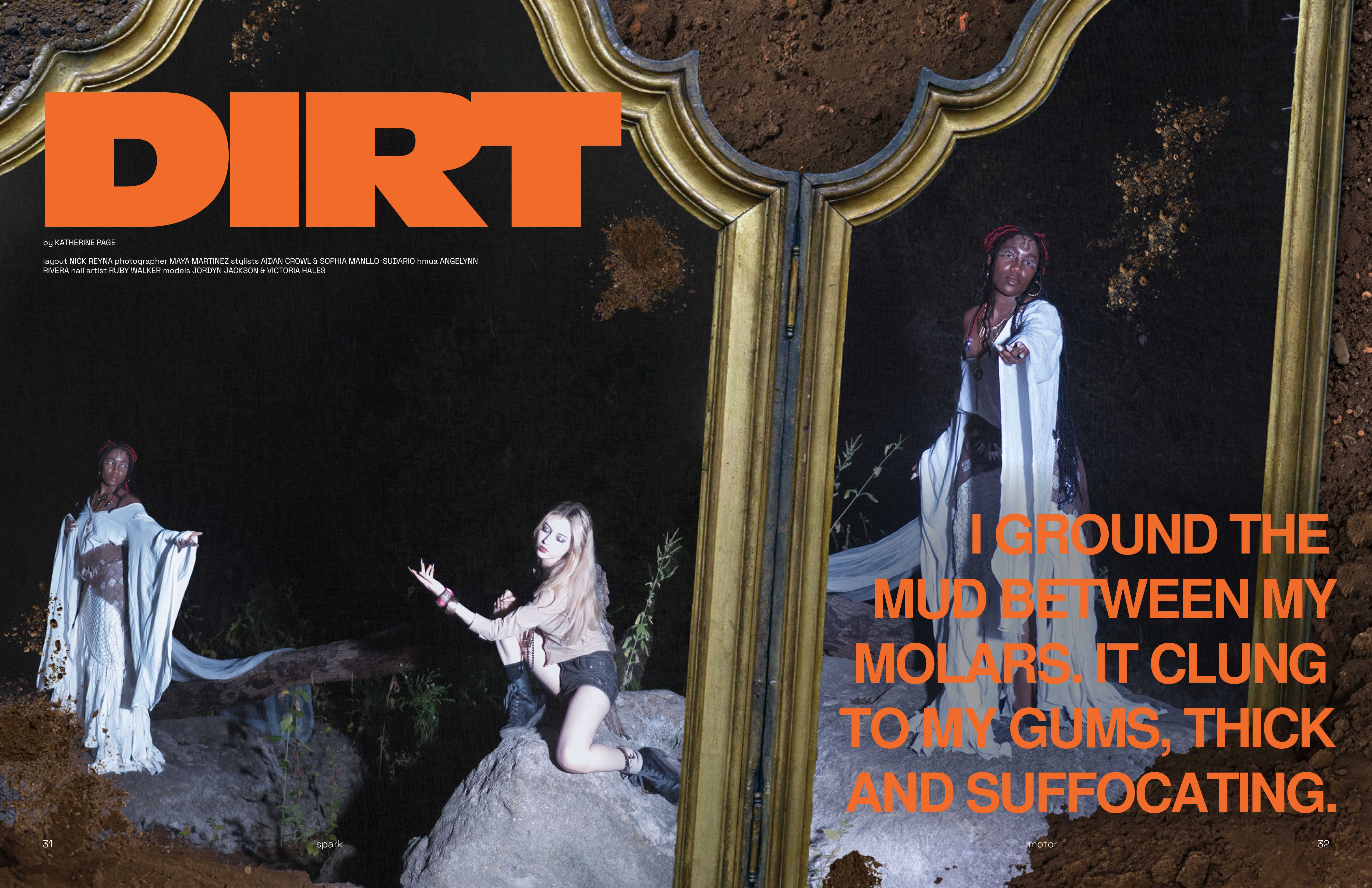
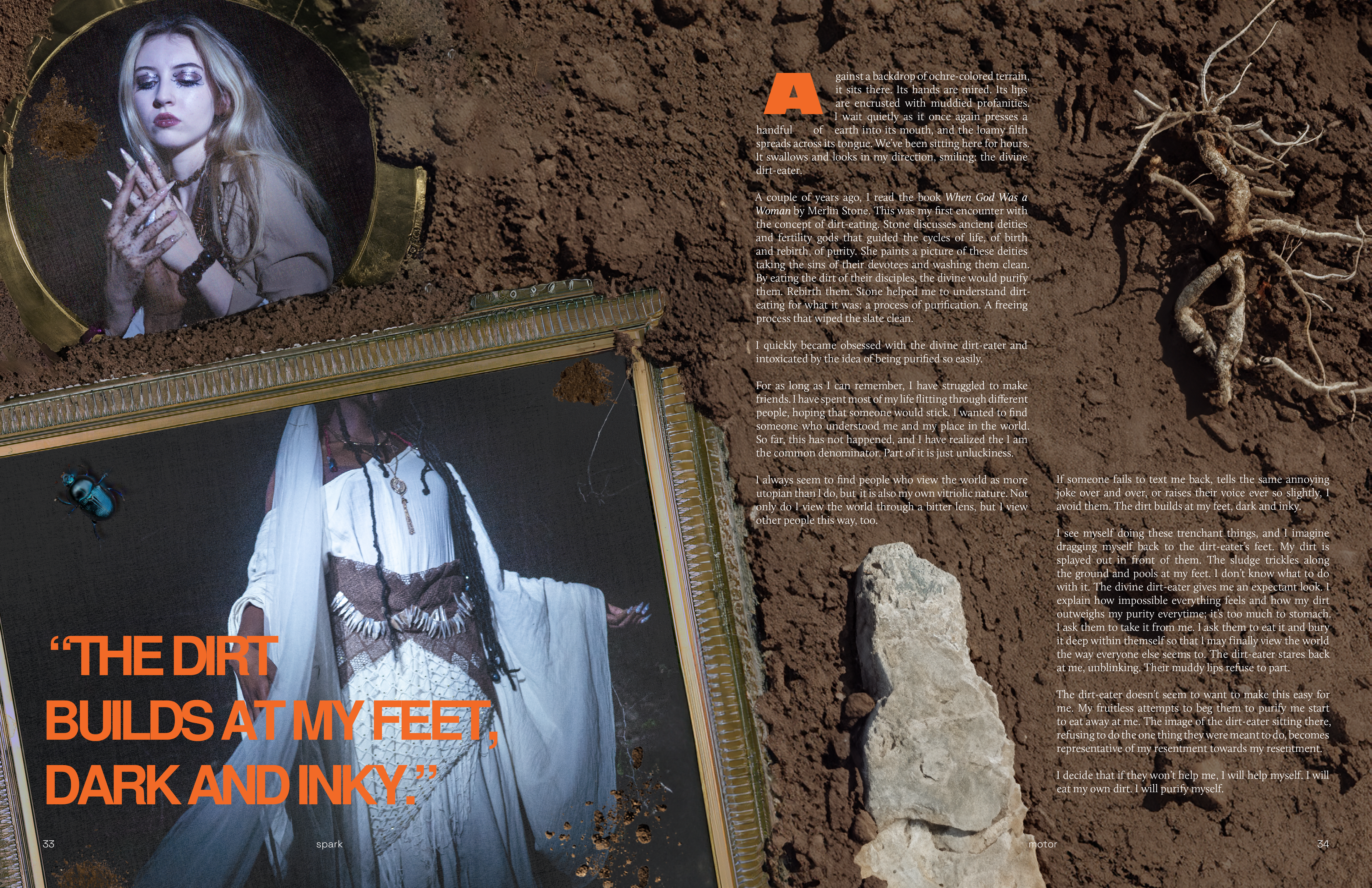
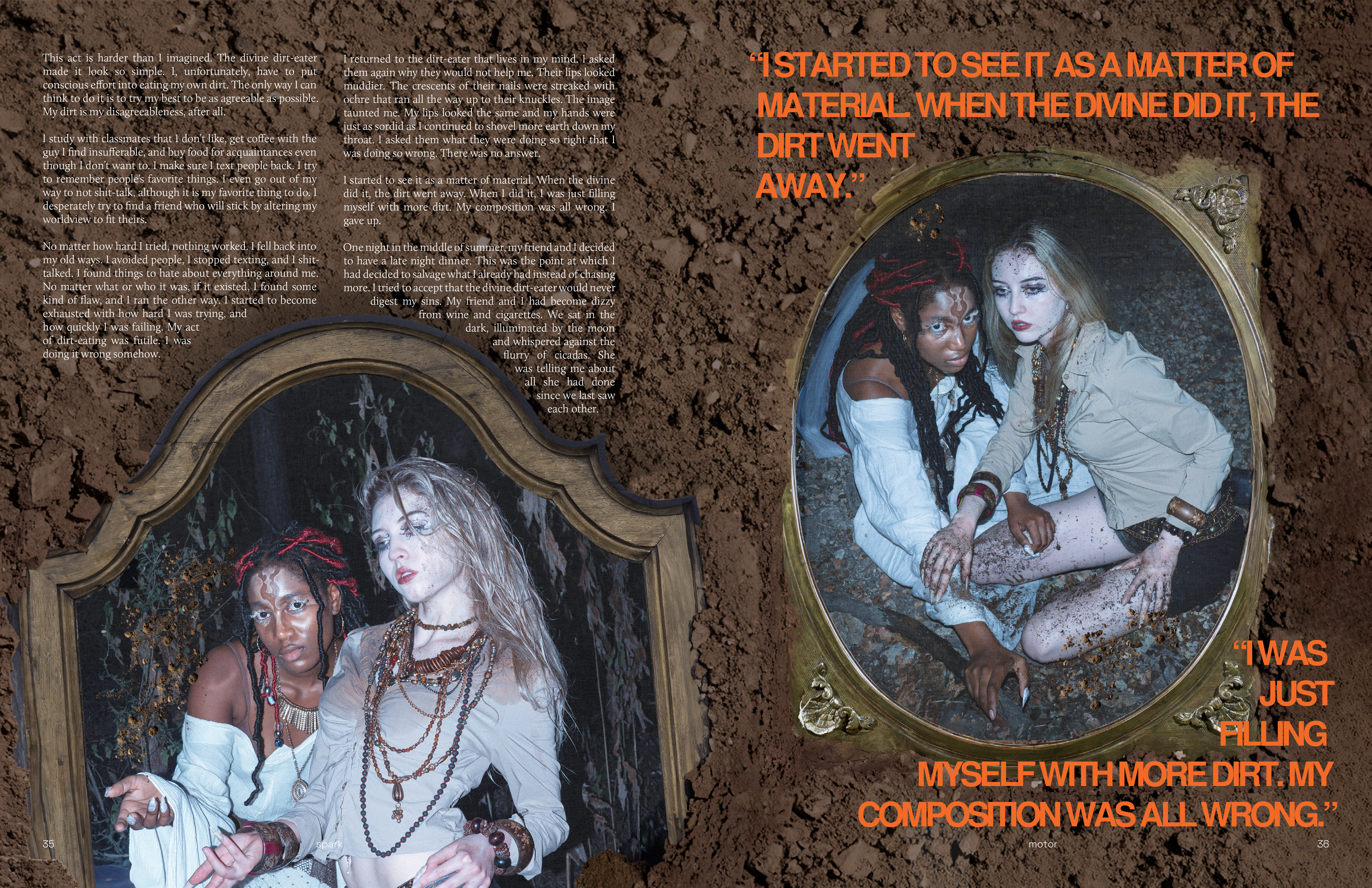
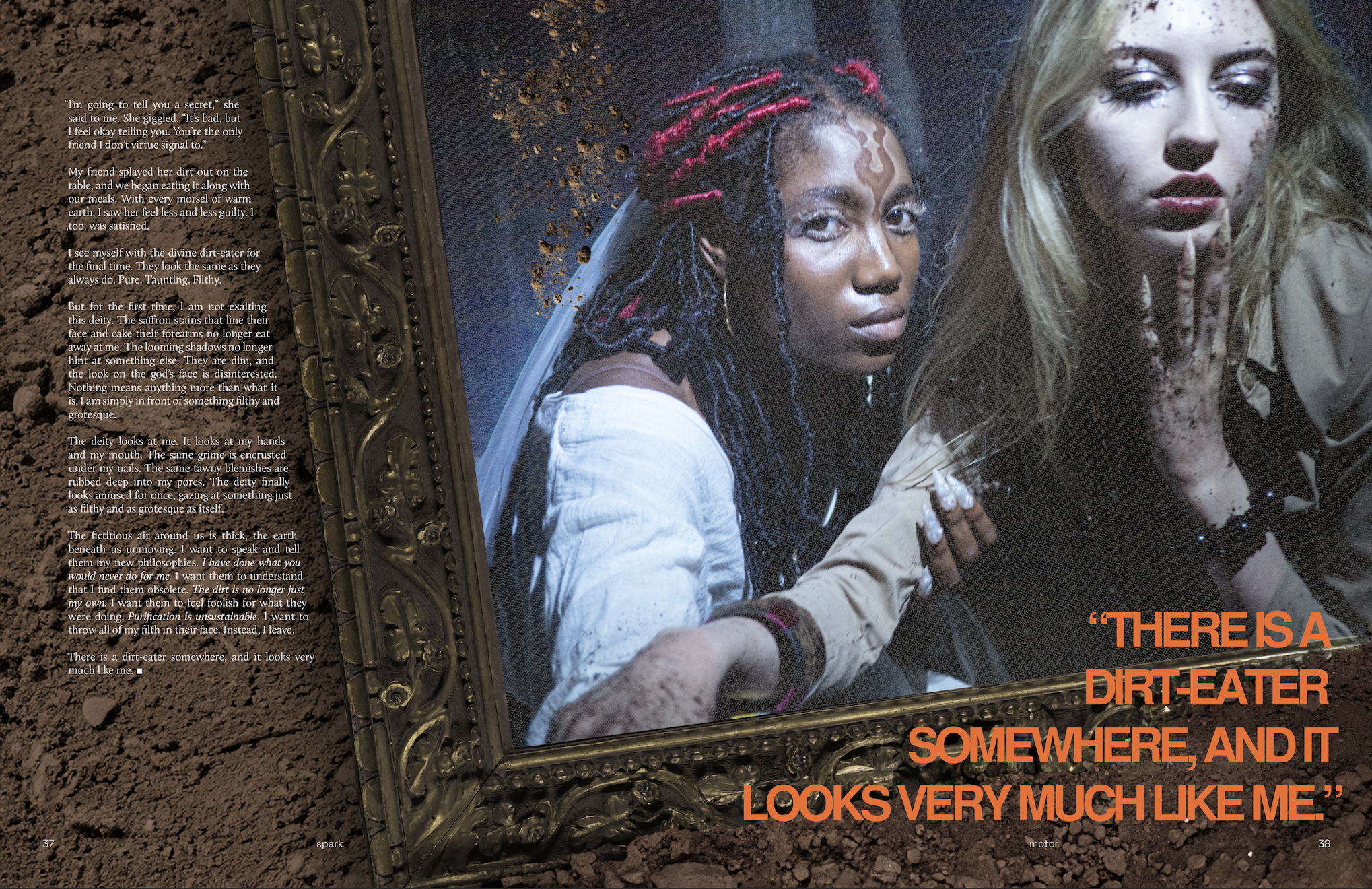
| I grind the mud between my molars. It clings to my gums, thick and suffocating. |
Against a backdrop of ochre-colored terrain, it sits there. Its hands are mired. Its lips are encrusted with muddied profanities. I wait quietly as it once again presses a handful of earth into its mouth and the loamy filth spreads across its tongue. We’ve been sitting here for hours. It swallows and looks in my direction, smiling: the divine dirt-eater.
A couple of years ago, I read the book When God Was a Woman by Merlin Stone. This was my first encounter with the concept of dirt-eating. Stone discusses ancient deities and fertility gods that guided the cycles of life. Of birth and rebirth. Of purity. She paints a picture of these deities taking the sins of their devotees and washing them clean. By eating the dirt of disciples, the divine would purify them. Rebirth them. Stone helped me to understand dirt-eating for what it was: a process of purification. A freeing process that wiped the slate clean.
I quickly became obsessed with the divine dirt-eater. I became intoxicated by the idea of being purified so easily.
For as long as I can remember, I have struggled to make friends. I have spent most of my life flitting through different people, hoping that someone would stick. I wanted to find someone who understood me and my place in the world. So far, this has not happened, and I have realized the I am the common factor. Part of it is just unluckiness. I always seem to find people who view the world as more utopian than I do, but it is also my own vitriolic nature. Not only do I view the world through a bitter lens, but I view other people this way, too.
If someone fails to text me back, tells the same annoying joke over and over, or raises their voice ever so slightly, I avoid them. The dirt builds at my feet, dark and inky.
I see myself doing these trenchant things, and I imagine dragging myself back to the dirt-eaters feet. My dirt is splayed out in front of them. The sludge trickles along the ground and pools at my feet. I don’t know what to do with it. The divine dirt-eater gives me an expectant look. I explain how impossible everything feels and how my dirt outweighs my purity everytime; it’s too much to stomach. I ask them to take it from me. I ask them to eat it and bury it deep within themselves so that I may finally view the world the way everyone else seems to. The dirt-eater stares back at me, unblinking. Their muddy lips refuse to part.
The dirt-eater doesn’t seem to want to make this easy for me. My fruitless attempts to beg them to purify me start to eat away at me. The image of the dirt-eater sitting there, refusing to do the one thing they were meant to do, became representative of my resentment towards my resentment.
I decide that if they won’t help me, I will help myself. I will eat my own dirt. I will purify myself.
This act is harder than I imagined. The divine dirt-eater made it look so simple. I, unfortunately, have to put conscious effort into eating my own dirt. The only way I can think to do it is to try my best to be as agreeable as possible. My dirt is my disagreeableness after all.
I study with classmates that I don’t like, get coffee with the guy I find insufferable, and buy food for acquaintances even though I don’t want to. I make sure I text people back. I try to remember people’s favorite things. I even go out of my way to not shit-talk, although it is my favorite thing to do. And I desperately try to find a friend who will stick by altering my worldview to fit theirs.
No matter how hard I tried, nothing worked. I fell back into my old ways. I avoided people, I stopped texting, and I shit-talked. I found things to hate about everything around me. No matter what or who it was, if it existed, I found some kind of flaw, and I ran the other way. I started to become exhausted with how hard I was trying, and how quickly I was failing. My act of dirt-eating was futile. I was doing it wrong somehow.
I returned to the dirt-eater that lives in my mind. I asked them again why they would not help me. Their lips looked muddier. The crescents of their nails were streaked with ochre that ran all the way up to their knuckles. The image taunted me. My lips looked the same and my hands were just as sordid as I continued to shovel more earth down my throat. I asked them what they were doing so right that I was doing so wrong. There was no answer.
I started to see it as a matter of material. When the divine did it, the dirt went away. When I did it, I was just filling myself with more dirt. My composition was all wrong. I gave up.
One night in the middle of summer, my friend and I decided to have a late night dinner. This was the point I had decided to salvage what I already had, instead of chasing more. I was trying to accept that the divine dirt-eater would never digest my sins. My friend and I had become dizzy from wine and cigarettes. We sat in the dark, illuminated by the moon, and whispered against the flurry of cicadas. She was telling me about all she had done since we last saw each other.
“I’m going to tell you a secret,” she said to me. She giggled. “It’s bad, but I feel okay telling you. You’re the only friend I don’t virtue signal to.”
My friend splayed her dirt out on the table, and we began eating it along with our meals. With every morsel of warm earth, I saw her feel less and less guilty. I too was satisfied.
I see myself with the divine dirt-eater for the final time. They look the same as they always do. Pure. Taunting. Filthy.
But for the first time, I am not exalting this deity. The saffron stains that line their face and cake their forearms no longer eat away at me. The looming shadows no longer hint at something else. They are only dim, and the look on the god’s face is only disinterested. Nothing means anything more than what it is. I am simply in front of something filthy and grotesque.
The deity looks at me. It looks at my hands and my mouth. The same grime is encrusted under my nails. The same tawny blemishes are rubbed deep into my pores. The deity finally looks amused for once, gazing at something just as filthy and as grotesque as itself.
The fictitious air around us is thick, the earth beneath us unmoving. I want to speak and tell them my new philosophies. I have done what you would never do for me. I want them to understand that I find them obsolete. The dirt is no longer just my own. I want them to feel foolish for what they were doing. Purification is unsustainable. I want to throw all of my filth in their face. Instead, I leave.
There is a dirt-eater somewhere, and it looks very much like me. ■
Layout: Nicholas Reyna
Photographer: Maya Martinez
Stylists: Aidan Crowl & Sophia Manllo-Sudario
HMUA: Angelynn Rivera
Nail Artist: Ruby Walker
Models: Jordyn Jackson & Victoria Hales
Other Stories in Motor
The Devil
By Dillon Luong
December 8, 2024
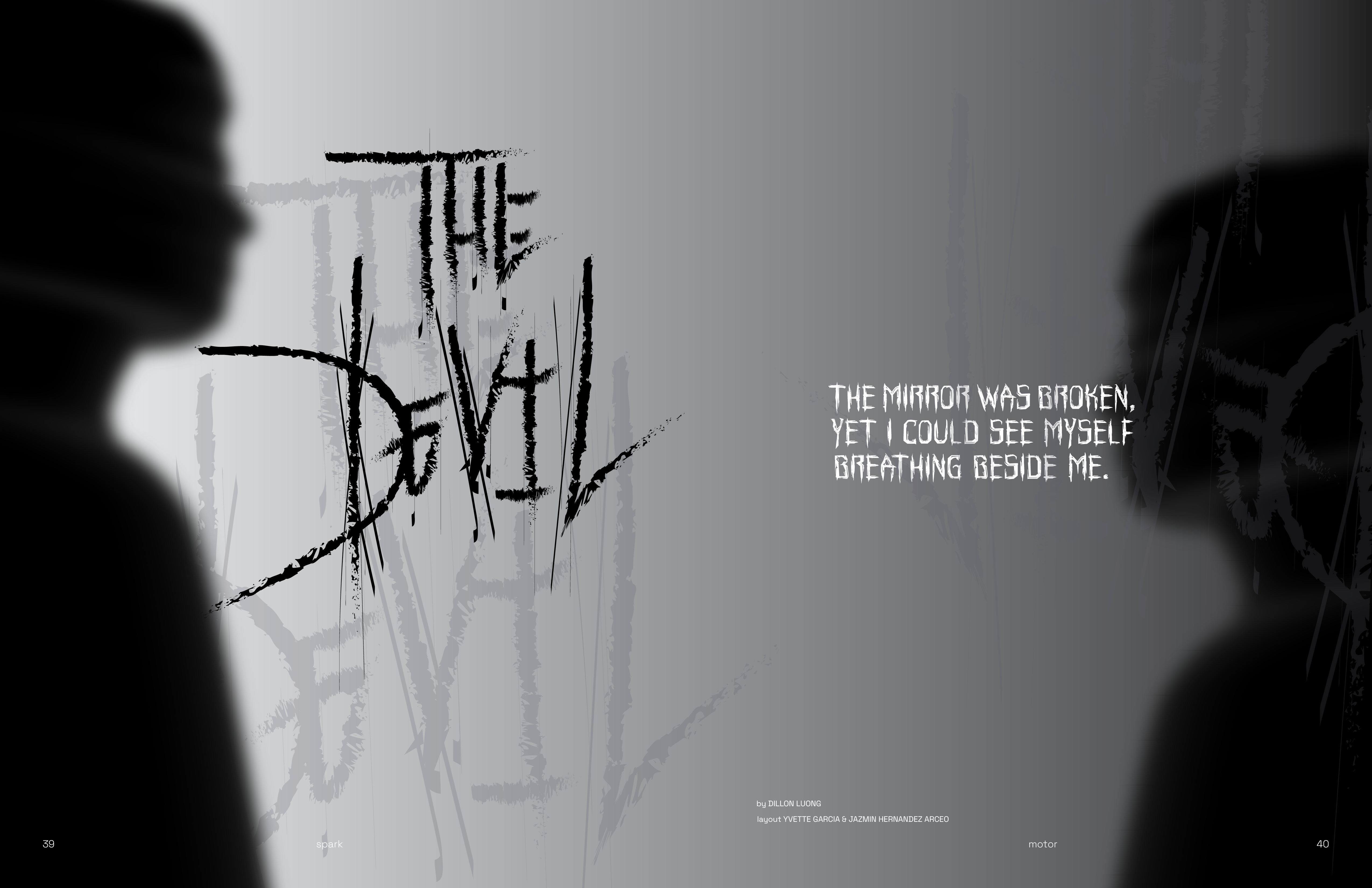

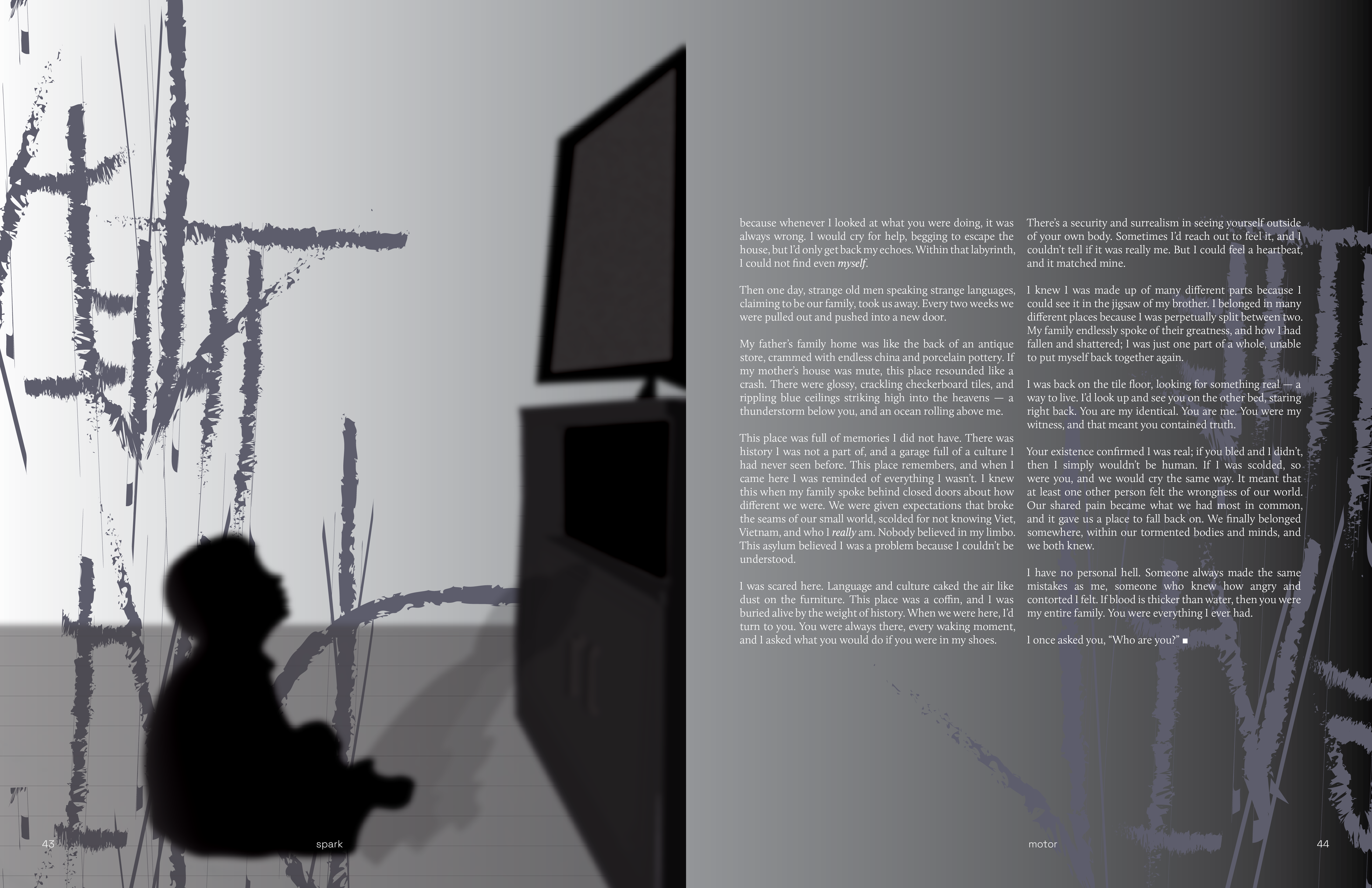
The mirror was broken, yet I could see myself breathing beside me.
Your memory is a maze, full of hallway into turn into turn into turn. There are always two doors.
The house is washed out, everything is white: the corners, the countertops, the crop-dust marble tile. This place lulls you like a mirage and you melt into the hot room, falling to the tile floor. You are looking for something cool to the touch — something real.
You look up and see yourself sitting beside you on the other bed, staring right back. You are an identical twin. You are my identical twin. I am you.
At first, I didn’t know if you were real. I was just a kid. That house was placeless, and you were the imaginary friend that belonged to it. It was our mother’s house, hazy and without personality. She grew up a mixed kid after the Vietnam War. This meant that in her own country, she was nicknamed The Devil — an embodiment of what white men had done to Vietnam’s dignity — and was orphaned and ostracized to the States. She became a single mother without a culture. We became a family without precedent, so you and I were never complete — in limbo.
I know I am real; I remember my mother’s house. I remember staring into speckled, popcorn walls as Saturday cartoons beat on deaf eardrums. The world was muffled as my senses suffocated with asthma. All would be quiet until I heard wheezing to my left, and I would turn, and see you again. You were a reminder that my voice and breath were being used by someone else. My ability to cry out and to live was someone else’s right, and I remember how you would steal the act of existence from me. I did not have a place or being. Yet, you were somehow both.
In elementary school, I learned that siblings imitated each other. This was how you took parts of me, and I knew I had to find myself anew, and anew, and anew. I had to be more than the empty foundations laid upon us, more than everything you took to fill that void; I had to be more than even myself, or else I would have nothing.
Our mother’s house crumpled up like balls of paper. Her house was all she owned. I was standing within everything her life amounted to; her entire self, written on those paper walls. I couldn’t discern each crinkle without a culture. My mother was scattered across the house like ashes. Sometimes, I’d look for her – where I started and ended – and the hallways always led me back where I began, and you were still there. We’d scribble crayon all over the house, hoping to chart the sameness that kept us in circles. But all we'd see were a madman's scrawls, trying to prove he wasn’t talking to himself.
You were my reflection, and we lived in a house of mirrors. I was everything and everything was me; I was meaning, and if you mimicked my every movement, I, too, was creation. I sought an epiphany, deriving meaning from itself, but everything I tried had already been done on the other side of the glass. This was how I found hell, by searching for divinity.
All I found was endless insecurity and fault in what I saw because I was only human. Being a twin meant that you were the weakness and sin I had to excise — an enemy and a means to an end. If I was in some indeterminate hell, and my mother was evil incarnate, then when you stood across from me, mirroring my countenance and contemplations, what did that make you? I began to claw at my face wishing I looked like anything but you. I knew you wanted to become me.
When we entered middle school, our mother spoke of becoming important — someone with power, money, and everything they wanted. She wanted more for us than she ever had, so we competed for everything. You were a doppelganger trying to take over my life. We shared the same interests, the same friends, and the same grades. There was an expectation: if I didn’t reach the finish line first, I would be trapped in the sameness that haunted me. I didn’t know where this would end, and looking over at you was like cheating on myself. Our mother wanted us to become something; I only wanted to become someone.
If you were me, then I was the narrator watching my own predictable story. You made my mistakes, and I learned while watching from the outside in. Having a twin means seeing your reflection, and watching it move on its own; I couldn’t tell if it gave me more or less control of my identity. I wasn’t a person. I was I, and you were you. Everything you did was my road not taken and, suddenly, the mirror between us became a kaleidoscope of who I was, wasn’t, and will be.
You were a cuckoo, implanted in my nest and chasing me to be me first. Our mother never compared us to others, only to each other, like she could only support one of us. We had no excuses. We were the same person. All of my faults were splayed out in front of me. In you. I hated you. You were here to prove that I couldn’t beat even my own expectations, that I was a shadow of someone else. I couldn’t fathom making my own decisions, knowing that someone knew them before I did. I couldn’t trust myself or my perspective on the world because whenever I looked at what you were doing, it was always wrong. I would cry for help, begging to escape the house, but I’d only get back my echoes. Within that labyrinth, I could not find even myself.
Then one day, strange old men speaking strange languages, claiming to be our family, took us away. Every two weeks we were pulled out and pushed into a new door.
My father’s family home was like the back of an antique store, crammed with endless china and porcelain pottery. If my mother’s house was mute, this place resounded like a crash. There were glossy, crackling checkerboard tiles, and rippling blue ceilings striking high into the heavens — a thunderstorm below you, and an ocean rolling above me.
This place was full of memories I did not have. There was history I was not a part of, and a garage full of a culture I had never seen before. This place remembers, and when I came here I was reminded of everything I wasn’t. I knew this when my family spoke behind closed doors about how different we were. We were given expectations that broke the seams of our small world, scolded for not knowing Viet, Vietnam, and who I really am. Nobody believed in my limbo. This asylum believed I was a problem because I couldn’t be understood.
I was scared here. Language and culture caked the air like dust on the furniture. This place was a coffin, and I was buried alive by the weight of history. When we were here, I’d turn to you. You were always there, every waking moment, and I asked what you would do if you were in my shoes.
There’s a security and surrealism in seeing yourself outside of your own body. Sometimes I’d reach out to feel it, and I couldn’t tell if it was really me. But I could feel a heartbeat, and it matched mine.
I knew I was made up of many different parts because I could see it in the jigsaw of my brother. I belonged in many different places because I was perpetually split between two. My family endlessly spoke of their greatness, and how I had fallen and shattered; I was just one part of a whole, unable to put myself back together again.
I was back on the tile floor, looking for something real — a way to live. I’d look up and see you on the other bed, staring right back. You are my identical. You are me. You were my witness, and that meant you contained truth.
Your existence confirmed I was real; if you bled and I didn’t, then I simply wouldn’t be human. If I was scolded, so were you, and we would cry the same way. It meant that at least one other person felt the wrongness of our world. Our shared pain became what we had most in common, and it gave us a place to fall back on. We finally belonged somewhere, within our tormented bodies and minds, and we both knew.
I have no personal hell. Someone always made the same mistakes as me, someone who knew how angry and contorted I felt. If blood is thicker than water, then you were my entire family. You were everything I ever had.
I once asked you, “Who are you?”
You shrugged. I shrugged too. There is no answer greater than silence, and no punishment greater than forgiveness. There’s a comfort in seeing through the windows of your own soul, knowing that this hell is real. The devil might be in front of you for all you know, but for some reason or another, he looks exactly like you. ■
Layout: Yvette Garcia & Jazmin Arceo Hernandez
Other Stories in Motor
© 2025 SPARK. All Rights Reserved.
